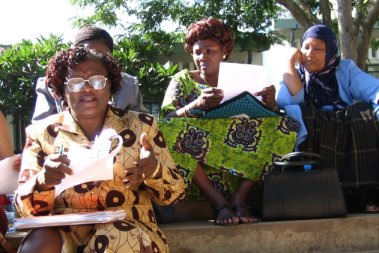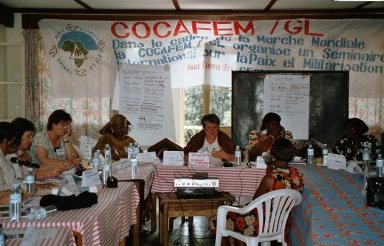2000 - Collective on peace
- WOMEN APPEAL FOR PEACE
- SEMINAR and CAMPAIGN AGAINST SEXUAL VIOLENCES
- DECLARATION
- COLLECTIVE PEACE and DEMILITARIZATION
- LEARN MORE
- Call to action of the anti-war assembly
World Social Forum 2005, Porto Alegre, Brazil - Call to action of the anti-war assembly
1. WOMEN APPEAL FOR PEACE
We, women of the World March of Women, who are gathered in Kigali, Rwanda, from December 4–12, 2004, for the 5th International Meeting, are issuing an appeal for peace in the Great Lakes Region of Africa and throughout the world.
We are deeply concerned by an escalation of the persistent wars and armed conflicts in the Great Lakes Region.
We note with bitterness:
- that women and children are particularly affected by these conflicts and
suffer grave consequences. These include killings, sexual violence―especially rape used as a weapon of war ―violence of all kinds, kidnappings, sex trafficking, massive forced displacements of civilians, deepening poverty, and the spread of HIV/AIDS;
- that the fundamental cause of violence against women is a solidly entrenched patriarchal system that marginalizes women and denies them their needs and rights on the basis of their gender;
- the non-application of Resolution 1325 of the United Nations Security Council;
- that, despite their assigned mandate, peacekeepers in the sub-region are not improving the situation, and that some of them are also committing acts of sexual violence, which is aggravating the conflict;
- that the international conflict management system, such as United Nations mechanisms, is not effective;
- that the uncontrolled manufacture, sale and distribution of arms contributes to persistent insecurity and destabilization of the sub-region and also of the whole world;
- that the culture of impunity has taken root in the sub-region and throughout the world;
- that war is the result of patriarchy and an unjust system of distribution and access to the world’s wealth;
- that the rebel groups and other negative forces, who are driven by a genocidal ideology, are still operating in the Great Lakes Region of Africa;
- that political and economic powers are encouraging this situation to further their self-centred economic interests.
We denounce:
- the rebel groups and negative forces that are still present in the sub-region, who are causing instability, raping women, young girls—even other men—and thereby jeopardizing the peace;
- the negative role played by national and international media, whose messages heighten the conflicts by distorting reality.
We call for:
- the international community to pressure and hold accountable the sub-region’s governments that were party to the accords and have not respected those agreements.
- the United Nations to adapt its mandate to the situation in the countries of the Great Lakes and immediately disarm the rebel groups and negative forces in the sub-region;
- the United Nations to punish peacekeepers responsible for committing acts of sexual violence against women and young girls;
- humanitarian aid agencies to protect the civilian population, denounce acts of sexual violence against women and young girls and ensure that rape victims are provided with appropriate assistance;
- the governments of the countries in the Great Lakes region to resolve their conflicts through genuine dialogue by engaging women in the process, in conformance with Resolution 1325 of the United Nations Security Council;
We demand:
- that women be recognized as actors and negotiators for peace and that they participate in all peaceful conflict prevention, management and resolution processes, as well as in the reconstruction of their respective countries;
- that the African Union assume its responsibility by becoming effectively involved in resolving conflicts between African countries;
We call on:
- the different governments of the sub-region to respect the commitments they undertook in signing the different peace accords; enact a ceasefire; disarm the negative forces; and apply the non-aggression pacts.
We appeal:
- to the civilian population in countries torn by conflict to denounce all human rights violations, in particular, violence against women and children and the ongoing state of war.
We declare:
- our solidarity with women suffering in situations of conflict and war throughout the world.
2. SEMINAIR and et CAMPAIGN ON SEXUAL VIOLENCE AGINST WOMEN
Participants in the World March of Women International Seminar on Peace and Militarization, held September 26–30, 2004, in Goma, Democratic Republic of Congo
decided to launch a global campaign on sexual violence against women in conflict situations and militarized zones that will begin on November 25, 2004 and will last one year.
"Militarization has dramatically increased under the pretext of the 'war on terrorism.' The impacts on women of this rising militarism are numerous: rape, torture, mutilation, kidnapping, extra-judicial killings, prostitution and sex-trafficking of women, the demolition of homes and other property damage. Militarization also increases poverty. Economic resources and wealth are invested in the manufacture and purchase of weapons instead of social programs and education that benefit society as a whole."
This paragraph was taken from the Statement issued by participants in the World March of Women (WMW) International Seminar on Peace and Militarization, held September 26–30, 2004, in Goma, Democratic Republic of Congo. The seminar resulted in the decision to launch a global campaign on sexual violence against women in conflict situations and militarized zones.
A seminar in a conflict zone
Some 40 women participated in the seminar. They came from countries around the world where wars and armed conflict are or were raging: Burma, Israel, Uganda, Philippines, El Salvador and Sudan; they were also representing groups working on the issue of violence against women (Sweden and Switzerland). Joining them were women of the region— Burundi, Rwanda and the Democratic Republic of Congo (South and North Kivu)—who made up half of the assembled participants. International peace networks sent representatives or provided support in the form of analysis and documentation: Women in Black (Belgrade) and the Women's International League for Peace and Freedom (Burundi).
For five days these women talked about their experiences. They defined the role they believe women should play in preventing and resolving conflict and promoting peace. They analyzed the impacts of conflicts on women that are intrinsically related to security, violence against women, poverty, and the injustice and inequality associated with decision-making. Participants also decided to support implementation of the UN Security Council's resolution 1325 (demanding the consideration of gender and women's participation at all levels of conflict resolution and peace construction efforts). Many of the groups represented had already formulated actions and educational tools on this subject.
Last, participants considered the 2005 actions being planned by the World March of Women, in particular the actions related to the Women's Global Charter for Humanity. The Women's Global Charter for Humanity will be adopted by delegates attending the WMW's 5th International Meeting, taking place from December 4–12, 2004, in Kigali, Rwanda. The Charter describes the world woman want to build, a world where one of the basic values is peace.
A one-year campaign
The Peace and Demilitarization collective decided to launch a global campaign on sexual violence against women in conflict situations and militarized zones.
The campaign will begin on November 25, 2004. It will continue for a year. In the first stage, from November 25, 2004 to May 24, 2005, groups that work with women victims of sexual violence will inventory incidents of sexual violence against women in armed conflict and militarized zones. They will assess the actions undertaken by the government to provide justice to these women and prevent the phenomenon from recurring; they will also carry out lobbying and public education campaigns based on these cases.
The information gathered will be made public on May 24, 2005 (International Women's Day for Peace and Disarmament). This information will be used in a publication to be distributed to March participating groups as a tool for national lobbying efforts. The data will also be used in the framework of specific events like International Peace Day, September 21.
The desire for reconciliation
The meeting held in the Democratic Republic of Congo would not have been possible without the determined will of women in a region where States had been in conflict and communities wiped out to work across geographic, ethnic and tribal boundaries for peace and reconciliation. The region's March coordinating body, COCAFEM/GL (Concertation des collectifs oeuvrant pour la promotion de la femme dans la région des Grands Lacs), created in 2000 by women in Burundi, Democratic Republic of Congo and Rwanda, also works to improve the status of women in the African Great Lakes sub-region.
COCAFEM-GL is responsible for the World March of Women's Peace and Demilitarization collective (see below).
3. DECLARATION
International seminar on peace and demililitarisation
September 26-September 30, 2004, We, women from the Peace and Demilitarisation Collective of the World March of women conclude that widespread physical and sexual violence against women are taking place everywhere in the world. Sexual violence is prevalent particularly in conflict areas and in occupied territories or countries where women are even used as objects of the conflicting partners.
We declare that the fundamental basis of violence against women is due to the deep rooted patriarchal system where women are marginalized and their needs and rights are denied as a result of their gender.
Militarisation has dramatically increased under the pretext of this “war against terrorism”. The impacts on women of this rising militarism are numerous: such as rape, torture, mutilation, kidnapping, extra judicial killings, prostitution and the sexual trafficking of women as well as the demolition of houses and other property damage. Militarisation also increases poverty. Economic resources and wealth are invested into the manufacturing and purchasing of weapons instead of being invested into social programs and education that benefit the whole of the society.
We denounce all forms of violence, sexual, physical or psychological that women are subjected to in conflicts, in occupations, in militarised zones and in their daily lives.
We denounce patriarchy, fundamentalism, and racism, which creates militarised societies and the feminization of poverty.
We denounce the spreading of hatred and divisions within communities that are purposely created to manifest a situation of genocide and ethnic cleansing.
We denounce impunity that allows the vicious cycle of violence against women to continue and that leads to no justice for the survivors and the communities affected
We stand in solidarity with:
We call on the Secretary General of the UN, Kofi Annan to make all efforts to pressure member states to implement Resolution 1325 of the United nations Security Council.
We call on the international community to stand with us against sexual violence and to take action to prevent this sexual violence from continuing
We call on governments to make accountable the perpetrators of sexual violence and to bring them to justice
Women’s participation in the struggle for creating a culture of peace is crucial. By fully bringing in the gender perspective into conflict prevention, in crisis management and in post-conflict peace-building, we are ensuring that women are principal actors in building peace and that their rights are respected.
4. COLLECTIVE PEACE and DEMILITARIZATION
Collective on peace and desmilitarisation has to develop a WMW policy in this area; ensure the participation of the WMW in actions to oppose militarism and armed conflicts, etc.; and produce materials on these issues.
COCAFEM-GL is responsible for the World March of Women's Peace and Demilitarization collective. The collective coordinates analysis and intervention by the World March of Women in the area of peace and demilitarization and seeks to ensure the participation of women in peace processes at the local and international levels. The organization unites women from four groups: PRO-FEMMES of Rwanda, CAFOB of Burundi, CAFED Nord Kivu and COFAS Sud Kivu of the Democratic Republic of Congo.
References of Websites dealing peace and DEMILITARIZATION issues :

Women writing the Appeal, Kigali, December, 2004.

Picture Bianca Miglioretto
Goma, Democratic Republic of Congo

Picture Bianca Miglioretto
Last modified 2006-03-23 03:08 PM
This item is available in
Français, English, Español


